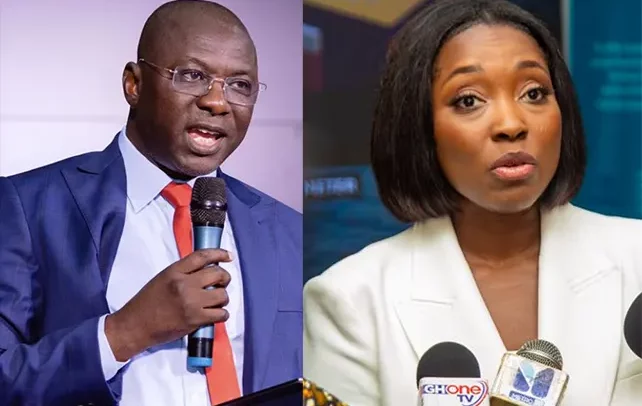Dr. Amin Adam and Dr. Serwaa Sarpong
Ghana must deepen public-private partnerships (PPPs) to leverage technological innovation in addressing persistent tax revenue leakages, experts have urged, warning that failure to do so could further undermine the country’s ambitious economic reform agenda.
This position, advanced at a high-level National Dialogue convened by the University of Professional Studies, Accra (UPSA), highlighted the critical role of collaborative frameworks between government institutions and private sector technology providers.
The forum brought together academics, tax practitioners, policymakers and civil society actors to dissect the structural weaknesses undermining tax mobilisation in Ghana.
Chaired by Ga Mantse, King Tackie Teiko Tsuru II, and featuring remarks from former President John Agyekum Kufuor, the session underscored a clear consensus that the state cannot solve its revenue shortfall alone. Rather, a systematic, technology-driven partnership approach—modelled on existing private sector successes—offers the most credible path forward.
A key case study referenced throughout the dialogue was the intervention of Strategic Mobilisation Ghana Ltd (SML) in the downstream petroleum sector.
Citing data from the Ghana Revenue Authority (GRA), Dr. Eric Boachie Yiadom, Senior Lecturer at UPSA, noted that prior to SML’s engagement in May 2020, discrepancies between reported lifting volumes and taxable volumes stood at 3.2 billion litres.
Within four months of the company’s deployment of ultrasonic flow meters and real-time monitoring tools, the discrepancy had fallen by over 90 percent to 260 million litres.
“This is not hypothetical. These are measurable gains. The question now is whether the state is willing to expand these kinds of partnerships into other sectors where leakages are just as severe,” Dr. Yiadom asserted.
The urgency is reflected in the numbers. Ghana is estimated to lose over US$9 billion annually to tax leakages and inefficiencies, according to analysis presented by Professor Isaac Boadi, Dean of the Faculty of Accounting and Finance at UPSA. The GRA alone forgoes US$3 billion each year—representing roughly 30 percent of potential collections—due to illicit financial flows, under-invoicing, and poor data integration across agencies.
Meanwhile, the mining and oil and gas sectors together account for more than US$3.5 billion in uncollected revenues, owing to opaque royalty structures and tax evasion by informal operators. In gold mining alone, the country lost US$2 billion in 2022, with an estimated 60 percent of small-scale miners evading tax.
“Without systemic reform anchored in meaningful collaboration, tax leakage will continue to drain public finances—sapping the resources needed to build a more inclusive and resilient national economy, Dr. Richard K. Boso of the KNUST Business School said.
Despite incremental progress in digital tax filing and automation, experts argued that GRA’s existing technological tools remain fragmented. A former Finance Minister, Dr. Mohammed Amin Adam, pointed to the deployment of over 20 distinct tax software products within the authority, none of which are fully integrated.
“It is the most digitised public institution by quantity of tools, yet tax elasticity remains weak,” he said.
Dr. Adam advocated for a unified platform, supported by both public and private partners, to synchronise data collection, reduce human discretion, and improve compliance. He cited the rollout of electronic banking cards under previous reforms as a foundation for more comprehensive, real-time tax monitoring.
The dialogue made repeated reference to the need for data harmonisation. Professor Abdallah Ali-Nakyea of the University of Ghana School of Law highlighted the inconsistency in financial reporting across institutions.
The challenge, however, is not purely technical. As Professor Kwame Gyan, Head of Chambers at Kwame Gyan & Associates, pointed out, effective technology deployment must be anchored in public trust and institutional integrity.
“Our problem is not just economic. It is a governance problem. Systems without integrity are just systems—easily bypassed,” he warned.
This alignment, according to Dr. Yaa Serwaa Sarpong, Director of Support Services at SML Ghana, has already produced tangible outcomes. Monthly taxable fuel volumes have more than doubled—from 208 million litres before May 2020 to 450 million litres today. Over a four-year period, an additional 14.1 billion litres have been captured, yielding more than GH¢20 billion in tax revenue.
Duncan Amoah, Executive Secretary of the Chamber of Petroleum Consumers (COPEC), asked that the model be replicated in the upstream sector, stating that much potential tax revenue is lost there.
“If we are serious about this, we could triple the fiscal gains,” he said.
The forum closed with a clear call to action: deepen PPPs, consolidate fragmented digital tools, and create the legal infrastructure for data sharing across agencies. Failure to act, participants warned, would risk not only revenue shortfalls but the broader credibility of Ghana’s economic reform programme under International Monetary Fund (IMF) supervision.
A Daily Guide Report


